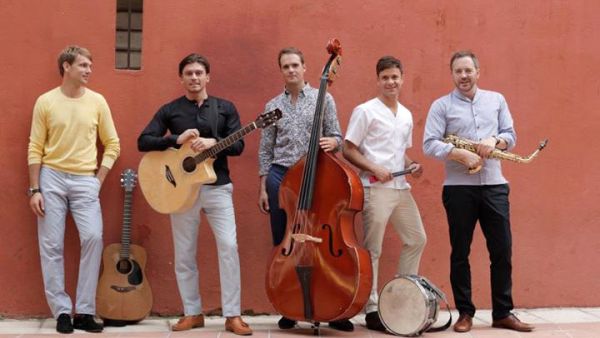Performers are not infrequently charismatic. Sometimes even journalists can be subjected to an entertainer’s charm. Witness The Gypsy Queens. Formed in Nice from players hailing from disparate corners of the world, and recently signed by U.K. record company Universal, the band was just in Beirut
The afternoon interview can best be summed up by its last 48 seconds, as lead singer Didier “Didi” Casnati belted out “Fly Me to the Moon” at a very public table at Falamanki restaurant.
“Let me play among the stars,” Casnati sang, altering the lyrics of the oft-covered love song to croon, “Let me see what spring is like on Lebanon and Mars.”
A gang of former street musicians who built a name for themselves performing for the likes of Elton John, Bono and Prince Harry, The Gypsy Queens released their first self-titled album in 2012 – a compilation of such classic cover tune as “L’Americano,” “You’ve Got a Friend,” and “Volare.”
The band was on its most recent trip to Lebanon this past week as part of a promotional tour bent on expanding their regional exposure. The Gypsy Queens played a private gig in the city Wednesday, and its members hope to see more of Lebanon, despite its dreary security situation.
“We’ve been to more dangerous places ... like the suburbs of L.A.,” Casnati said, provoking chuckles from his band mates. “Every single time we come here, everyone’s in such a good mood, no matter what. It’s incredible.”
The five-man band met while busking through the southern French city, which had lured them from all over Europe and North America – Casnati from Italy, bass player Jason King from the U.K., drummer Manuel Polin from Mexico, saxophonist Jay Metcalf from the U.S. and guitarist Anders Klunderud from Norway.
“I guess the story is different for all of us,” Casnati said. “Some were studying, others were busking and studying, some were only busking. I went on holiday there as a teenager and I always liked it. I wanted to study law, which I did for a bit. Nice would allow me to be busking longer than anywhere else.”
What does a busker do exactly? “I would say,” Casnati replies, “it’s giving pleasure to those who didn’t ask for it.”
Bands evolve over time and Casnati has been a member of The Gypsy Queens since its beginnings. He is also its mouthpiece. During this interview he offered up a steady stream of entertainment for the band’s more bashful members, who shared glances as he digressed, flirted and cursed his way through the conversation.
Jokes aside, busking has played a major role in the character of the band, said saxophonist Metcalf – the “serious one.”
“As buskers, we played acoustic music, so we had to use as much volume as we could. That’s why every one of us sings and plays an instrument at the same time,” he added. “Having vocals all over has been a major part of our act, so the Beach Boys and the Beatles have been a big part of our repertoire.”
He described their style as the Beach Boys’ Beatles version of the Rat Pack.
Though self-effacing, the band has an impressive list of contacts and friends, most of them made while working their way up through the music scene in southern France. Casnati said that, before being approached by Universal, they had been living the relative high life.
“We were getting flown all over the world to perform. I think we were all happy to live in the circumstances we live in and we weren’t sure having Universal Records was going to make us happier,” he recalled. “So, my first reaction was no, but thank you so much.”
The band reconsidered and as a result they’ve been able to team up with the likes of Julian Lennon, who will be helping The Gypsy Queens write some original songs for their second album.
In spite of promo tours and big collaborations, The Gypsy Queens have in nearly all of their interviews played down their fame.
“If you become famous, you don’t come back the next day and say, f**k I don’t want to be famous anymore. It’s not like being an architect who wakes up one day and says I want to be a botanist,” Casnati said. “It just happened that people liked us and then more people liked us.”








